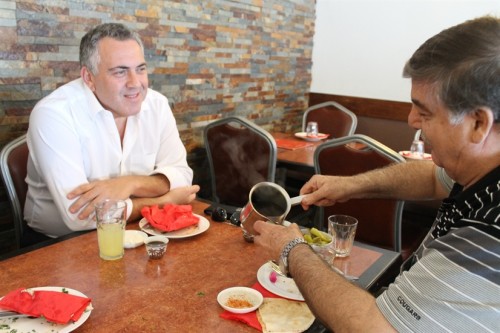Commission of Audit lays path for deep cuts
By Charis Palmer, The Conversation
HEAVY on warnings that “business as usual” will leave future generations of Australians saddled with excessive debt, the National Commission of Audit has delivered the government a comprehensive platform for deep spending cuts and significant policy reform.
The Commission, which focused its recommendations on the 15 largest and fastest growing government programs, has made 86 recommendations, with the aim of returning the budget to a sustainable surplus of 1% of GDP by 2023-24.
The recommendations, which if carried out would deliver the government estimated savings of A$60-$70 billion per year within ten years, would hit multiple government programs including pensions, health, family benefits, defence, school funding, higher education, aged care, foreign aid, housing and industry assistance.
Big ticket items include gradually increasing the eligibility age for the age pension to 70, cutting family benefits, deregulating higher education fees, changes to the minimum wage, $15 co-payments for all Medicare funded services, significant public service and industry assistance cuts, slowing down the delivery of the National Disability Insurance Scheme, and the benchmarking of the ABC against SBS when determining funding.
Commission chair Tony Shepherd said without change, Australia would end up with 16 years of budget deficits, and little to help it cope with an economic downturn.
“If we don’t fix the budget, Australia will have little or no buffer to meet future economic and financial shocks,” Shepherd said.
The Commission has also recommended abolishing seven government bodies, including the Clean Energy Finance Corporation, the Climate Change Authority and the Export Finance Insurance Corporation.
It recommends the merging of 35 bodies, the consolidation into other departments of 22, and the privatisation of nine government agencies, including Australia Post, the Royal Australian Mint, and NBN Co.
Some 15,000 public service jobs would also be cut, should the government follow through on the Commission’s recommendations.
The Commission has sought to level up the revenue raising capability of states and territories, and recommends providing the states with access to the federal government’s income tax base to do so.
In a nod to the Canadian system, it recommends states sharing GST revenue on an equal per capita basis, with a Commonwealth grant to ensure no state is worse off compared to the existing equalisation process.
In what would be a major shift from current federal/state government arrangement, the Commission has recommended abolishing the COAG reform council and moving reporting and staff to the Productivity Commission.
At the heart of the Commission’s report lies the argument that Australians should “re-assess our expectations of government for the overall good”.
Pensions
At the top of the list of government expenditures, the age pension has not escaped significant scrutiny by the Commission. It is forecast to rise 6.2% per year over ten years, rising from a current cost of $40 billion to $72 billion in 2023-24.
As expected, the Commission recommends the eligibility age be lifted to 70 over time. It suggests formally linking the eligibility age of the age pension to 77% of life expectancy at age 65 from 2033 – so the eligibility age would lift to around 70 by 2053.
Arguing the rationale for linking the age pension to male total average weekly earnings is weak, given women are a major part of the labour force, the Commission has recommended indexation be shifted to a new benchmark of 28% of average weekly earnings, transitioned over a 15 year period. This would kick off immediately by indexing the age pension maximum base rate to either growth in CPI or the Pensioner and Beneficiary Living Cost Index (whichever is highest).
The Commission has also recommended abolishing the current income and assets test and replacing it with a means test from 2027, including the principal residence in the means test for people with a home valued at $750,000 for a couple and $500,000 for a single pensioner.
It has also suggested increasing the superannuation preservation age to five years below the age pension, speeding up the current phased increase so that it reaches 62 by 2027.
On disability pensions, which have doubled in number over the last 20 years, the Commission has recommended applying a new disability assessment criteria to those under the age of 35, and transitioning to a new benchmark of 28% of average weekly earnings in line with the age pension changes.
Minimum wage
The Commission has argued Australia’s minimum wage is high by international standards, and as a result recommends the government establish a minimum wage benchmark set at 44% of Average Weekly Earnings.
It also suggests single people aged 22-30 be forced to relocate to higher employment areas or lose access to unemployment benefits after 12 months.
Health
The Commission of Audit has set its sights on the cost of Medicare-funded health services, calling for a $15 co-payment for all Medicare funded services with a 15 visit safety net, after which it would be $7.50. The cost would be $5 for concession card holders. It also wants the government to better target the Seniors Health Card to those most in need by including tax-free super income when determining eligibility.
It would also encourage the states to introduce a co-payment structure for public hospital emergency departments for less urgent conditions that could be handled by a GP, allow health funds to vary premiums to account for lifestyle factors, such as smoking, and set up a new independent body to oversee management of subsidised pharmaceuticals.
It suggests precluding higher income earners from accessing the private health insurance rebate and forcing them to take out private health insurance.
The Commission has also recommended the slower phasing in of the National Disability Insurance Scheme, which would require renegotiation with the states.
Family benefits
The Commission has argued Family Tax Benefit Part B is not well targeted and can act as a significant disincentive (mainly for women) to participate in the workforce, and has recommended it be abolished.
It has also recommended a new means test for Family Tax Benefit Part A, phasing out at 20 cents in the dollar for families who earn more than A$48,837. It recommends a new Family Benefit Part A for sole parents.
Paid parental leave
The Commission says the government’s proposed paid parental leave scheme is too expensive and should be lowered to the average weekly earnings of $57,460, indexed annually to movements in average weekly earnings. It suggests the savings of doing so be used for expanded child care assistance.
Education
Continuing its line of shifting some responsibility from the federal government to the states, the Commission has recommending transferring funding responsibility for government and non-government schools to the states, with annual funding in three pools – government, catholic and independent.
In higher education, a partial or full deregulation of fees for bachelor degrees is suggested, in order to increase competition in the sector.
The Commission has also recommended increasing the interest rate on Higher Education Loan Programme (HELP) loans, to reflect the full cost to the government. It also recommends reducing the annual income threshold for repayment from A$51,309 to the miniumum wage of $32,354, with a lower starting repayment rate of 2.5%.
The streamlining of five current HELP schemes would also help reduce the cost of the scheme, it suggests.
The Commission has recommended the federal government wind back involvement in vocational education and training, with policy and funding responsibility shifted to the states.
Industry assistance
The Commission has labelled the $5.1 billion worth of current direct industry assistance schemes as “considerable and ad-hoc”, and suggests the government step back, limiting itself to providing assistance to industry only in areas of genuine market failure.
With this in mind it has recommended the abolition of multiple industry assistance programs including the controversial Cadbury Factory funding, as well as the GM Holden grant, and the Clean Energy Finance Corporation. It also suggests the government significantly wind back export assistance by abolishing the Export Market Development Grants Scheme and the Export Finance Insurance Corporation.
The Commission also argues tourism industry grants should be abolished and Tourism Australia’s funding should be halved, with residual functions of Tourism Australia and Austrade moved into a commercial arm of the Department of Foreign Affairs and Trade.
On research and development, the Commission recommends the government abolish sector-specific R&D programs, and reduce support for rural R&D corporations.
It also recommends the government align the Australian Research Council and National Health and Medical Research Council grant processes.
Defence
The Commission has suggested the government “assess its fiscal priorities” against Tony Abbott’s commitment to increase defence spending to 2% of GDP within a decade.
It argues Defence should improve transparency on its spending, hold funds for new projects in separate budget allocations to be released as projects are approved, and appoint project development professionals skilled in cost and risk assessment.
More broadly, the Commission has recommended the government reduce staff numbers at Defence headquarters in Canberra, reducing them to 1998 levels.
Public broadcasting
The Commission has recommended the government cease funding for the Australia Network, but has stopped short of recommending deep cuts to public broadcasters the ABC and SBS.
“There is no right level of funding for the ABC and SBS,” the Commission said, but it argued both have capacity to improve their efficiency.
It has recommended the ABC and SBS be independently benchmarked, both against each other and commercial broadcasters, with future funding decisions informed by the outcome of the benchmarking.
![]()
This article was originally published on The Conversation.
Read the original article.
Who can be trusted?
In a world of spin and confusion, there’s never been a more important time to support independent journalism in Canberra.
If you trust our work online and want to enforce the power of independent voices, I invite you to make a small contribution.
Every dollar of support is invested back into our journalism to help keep citynews.com.au strong and free.
Thank you,
Ian Meikle, editor





Leave a Reply